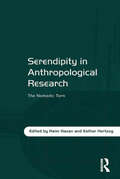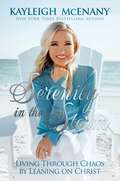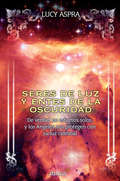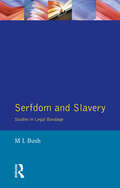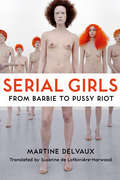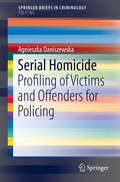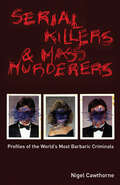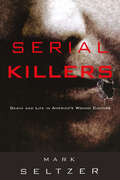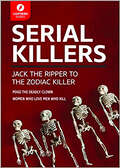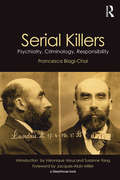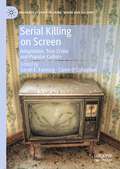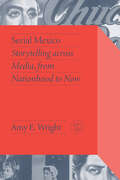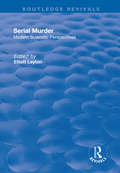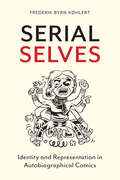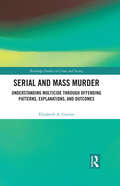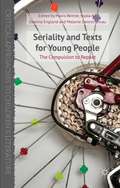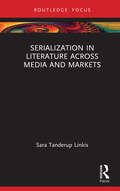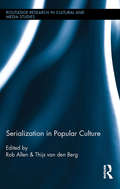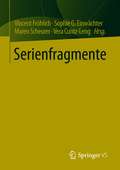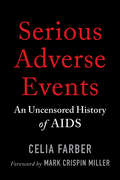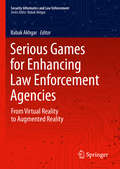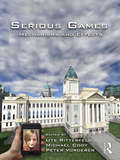- Table View
- List View
Serendipity in Anthropological Research: The Nomadic Turn
by Haim HazanChallenging the idea that fieldwork is the only way to gather data, and that standard methods are the sole route to fruitful analysis, Serendipity in Anthropological Research explores the role of fortune and happenstance in anthropology. It conceives of anthropological research as a lifelong nomadic journey of discovery in which the world yields an infinite number of unexplored issues and innumerable ways of studying them, each study producing its own questions and demanding its own methodologies. Drawing together the latest research from a team of senior scholars from around the world to reflect on the experience of research, Serendipity in Anthropological Research presents rich new case studies from Europe and the Middle East to examine both new and old questions in novel and enriching ways. An engaging examination of methodology and anthropological fieldwork, this book will appeal to all those concerned with writing ethnography.
Serenity Found: More Unauthorized Essays on Joss Whedon's Firefly Universe
by Jane EspensonA lot has happened since Finding Serenity. We learned River's secret; Mal took on the Alliance. Our favorite crew became Big Damn Heroes. And the Browncoats proved that hard work, passion and a little fan coordination can do the impossible. Serenity Found takes the contents of Finding Serenity even further, exploring not just the show but the events of the film as well, to create an anthology that's even more thought-provoking, fascinating and far-thinking than its predecessor. * Acclaimed science fiction author Orson Scott Card lauds "Serenity" as film sci-fi finally done right * Writer and comedian Natalie Haynes reveals the real feminist savvy of the "Firefly" universe: the girls get the guns and the gags * Pop culture critic Michael Marano connects damaged, ass-kicking River to the other weaponized women of the Whedonverse * Multiverse executive producer Corey Bridges explains why the world of "Firefly" is the perfect setting for an MMORPG * Mutant Enemy's visual effects wizard Loni Peristere relates what he's learned from Joss about telling stories, and tells a story of his own about Serenity's design * Television Without Pity recapper Jacob Clifton frames "Serenity" as a parable about media: how it controls us, how we can control it and how to separate the signal from the noise * And Nathan Fillion, "Firefly" and "Serenity's" Captain Malcolm Reynolds, shares his affinity for Mal and his love of Mal's ship and crew.
Serenity in the Storm: Living Through Chaos by Leaning on Christ
by Kayleigh McEnanyKayleigh McEnany brings to life the key cultural and political issues of our time, from the fall of Afghanistan to the Supreme Court&’s abortion decision, analyzing world events through the lens of faith and providing readers with Serenity in the Storm.Our world, without question, is experiencing aberrational times. The ravages and life-altering realities of COVID-19 that I worked through as White House press secretary were just the start of it. What followed was a series of history-defining events. From the fall of Afghanistan to the nationwide crime wave, we&’ve all endured painful images of death, destruction, and chaos. Meanwhile, radical teachings on gender and race have infiltrated our nation&’s schools, poisoning the minds of our children—all at a time when our country feels more divided than ever before. Along with these twenty-first century realities can come a feeling of despair and discouragement. Indeed, I hear it all the time as I crisscross the country: Americans feel disheartened and seek hope. Serenity in the Storm provides that hope. Despite the challenges we face, there is cause for great optimism for men and women of faith. In Afghanistan, the underground church is thriving. On the key issues of life and liberty, the Supreme Court of the United States has delivered enormous and consequential victories. In our schools, voters have spoken unmistakably against the insidious doctrines of critical race and gender theory. There is no doubt that God is at work as He hears the prayers of the faithful! Taking a similar format to my New York Times bestselling book, For Such a Time as This, I analyze our domestic and international challenges through the lens of faith. Though we have lived through dark times and unsettled waters, the storms we face have prompted many great leaders to rise to the moment and have left a yearning in the human heart for a Savior, Jesus Christ, who is walking alongside us every step of the way.
Seres de luz y entes de la oscuridad
by Lucy AspraDe verdad no estamos solos, y los Ángeles nos protegen con su luz celestial De Lucy Aspra, experta a nivel internacional en temas de ángeles y seres espirituales. Las rigurosas investigaciones de Lucy Aspra, sustentadas por una bibliografía espléndida y una escritura clara y envolvente, sorprenden no sólo por sus revelaciones, sino también por su extraordinaria capacidad para situar en su justo lugar a las presencias luminosas y a las entidades del mal. La autora de Seres de luz y entes de la oscuridad cierra una de las investigaciones del mundo sobrenatural más impactantes de los últimos años (iniciada con Ángeles y extraterrestres y Batalla cósmica, publicados por Alamah), en este tercer volumen nos enseña a reconocer la presencia y los prodigios de los ángeles, el maravilloso poder de la oración y la forma en que fuerzas negativas, a veces, se manifiestan a través de los duendes y los extraterrestres. Analiza el propósito de los mensajes subliminales y la manera de sobreponerse a sus efectos nocivos; hace un recuento de energías subterráneas y deidades peligrosas, para concluir con una reflexión sobre el amor y su energía vital. No hay duda de que esta obra estremecerá a los lectores y los obligará a una reflexión profunda para advertir que los brujos extraterrestres, las posesiones demoníacas y los exorcismos no son sólo una macabra fantasía.
Serfdom and Slavery: Studies in Legal Bondage
by M. L. BushSerfdom and Slavery compares the two forms of legal servitude in cultures in Western civilization, in Europe and the New World from ancient times to the modern period. Within a tightly controlled framework of general contextual chapters followed by specific case studies, a distinguished team of scholars offers 17 specially written essays that illuminate the nature, development, impact and termination of serfdom and slavery in European society. While the case studies range form classical Greece to early modern Brandenburg, and from medieval England to nineteenth-century Russia, the volume as a whole is closely integrated. It makes an important contribution to a topic of increasing international interest.
Serial Girls: From Barbie to Pussy Riot
by Martine DelvauxEverywhere you look patriarchal society reduces women to a series of repeating symbols: serial girls. On TV and in film, on the internet and in magazines, pop culture and ancient architecture, serial girls are all around us, moving in perfect sync—as dolls, as dancers, as statues. From Tiller Girls to Barbie dolls, Playboy bunnies to Pussy Riot, Martine Delvaux produces a provocative analysis of the many gendered assumptions that underlie modern culture. Delvaux draws on the works of Barthes, Foucault, de Beauvoir, Woolf, and more to argue that serial girls are not just the ubiquitous symbols of patriarchal domination but also offer the possibility of liberation.
Serial Homicide
by Agnieszka DaniszewskaThis Brief provides an overview and history of the definition of serial homicide, from the perspectives of psychology, medicine, criminology and forensics. It reviews research to provide a standard definition of serial homicide (as opposed to multiple or mass homicide), and provide insights on profiles of victims and offenders for police practitioners. It also includes a discussion of the media approach to covering serial homicide. The Brief is divided into four major sections covering: definitions and overview of serial homicide, profiling perpetrators according to different typologies, profiling victims, applied case studies, and recommendations for investigation and prevention. The author's approach is aimed primarily at researchers in police studies, but will be of interest to researchers in related fields such as criminal justice, sociology, psychology, and public policy.
Serial Killers & Mass Murderers: Profiles of the World's Most Barbaric Criminals
by Nigel CawthorneShocking true stories of the world’s most notorious criminals from the author of Prince Andrew: Epstein, Maxwell and the Palace.Serial Killers & Mass Murderers takes you into the minds of the criminals who committed the world’s most notorious and horrifying crimes. Each of the sadistic murderers profiled here was once known simply as someone’s neighbor, co-worker or child. What turned them into killers? In one chilling chapter after another, this book profiles a terrifying succession of homicidal maniacs and asks the question, “What makes them tick?”Through the pages of this haunting book, you’ll delve into the psyches of . . . Jeffrey DahmerThe Zodiac KillerDr. Harold ShipmanSon of SamThe Columbine KillersCharles MansonThe Night StalkerThe Yorkshire RipperTed BundyCharles StarkweatherThe Boston StranglerAnd more“The refrigerator contained meat, including a human heart, in plastic bags. There were three human heads in the freezer. Two more skulls were found in a pot on the stove. Another pot contained male genital organs and severed heads, and there were the remains of three male torsos in the trash.”
Serial Killers: Death and Life in America's Wound Culture
by Mark SeltzerIn this provocative cultural study, the serial killer emerges as a central figure in what Mark Seltzer calls 'America's wound culture'. From the traumas displayed by talk show guests and political candidates, to the violent entertainment of Crash or The Alienist, to the latest terrible report of mass murder, we are surrounded by the accident from which we cannot avert our eyes. Bringing depth and shadow to our collective portrait of what a serial killer must be, Mark Seltzer draws upon popular sources, scholarly analyses, and the language of psychoanalysis to explore the genesis of this uniquely modern phenomenon. Revealed is a fascination with machines and technological reproduction, with the singular and the mass, with definitions of self, other, and intimacy. What emerges is a disturbing picture of how contemporary culture is haunted by technology and the instability of identity.
Serial Killers: Jack the Ripper to The Zodiac Killer
by Lightning GuidesSerial Killers: Jack The Ripper to The Zodiac Killer is an exploration of the dark world of serial murder in the 20th and 21st century. Covering international cult figures from H.H. Holmes to Luis Garavito (La Beastia), examining psychological motivations of serial murderers, and presenting some of the most terrifying unsolved cases to date, Serial Killers provides an eerie peer into the oft uncovered world of murder and mystery.
Serial Killers: Psychiatry, Criminology, Responsibility
by Francesca Biagi-ChaiFrancesca Biagi-Chai’s book - a translation from the French of Le Cas Landru - tackles the issue of criminal responsibility in the case of serial killers, and other 'mad' people who are nonetheless deemed to be answerable before the law. The author, a Lacanian psychoanalyst and senior psychiatrist in France, with extensive experience working in institutional settings, analyses the logic informing the crimes of famous serial killers. Addressing the Landru case (which was the inspiration for Chaplin's Monsieur Verdoux), as well as those of Pierre Rivière and Donato Bilancia, Biagi-Chai casts light on the confusion that pervades forensic psychiatry and criminal law as to the distinction between mental illness and ‘madness’. She then elaborates the consequences of her argument in a sustained critique of the insanity defence. The book includes a Foreword by the renowned psychoanalyst, Jacques-Alain Miller, and an introduction by the translators on the question of insanity before the law in the US and in the UK, which considers the pertinence of Biagi-Chai’s argument for forensic psychiatry, for criminal law, and for the increasing contemporary focus on the assessment of dangerousness and risk-management strategies in crime control practices.
Serial Killers: Shocking True Stories of the World's Most Barbaric Murderers
by Jamie KingA gripping true crime compendium of some of the world's most infamous and shocking mass murderers, such as John Wayne Gacy, the Boston Strangler, the Moors murderers and Harold Shipman, as well as some lesser-known figures. This book not only relates the disturbing events that transpired but also delves into the psychology of the perpetrators.
Serial Killers: Shocking True Stories of the World's Most Barbaric Murderers
by Jamie KingA gripping true crime compendium of some of the world's most infamous and shocking mass murderers, such as John Wayne Gacy, the Boston Strangler, the Moors murderers and Harold Shipman, as well as some lesser-known figures. This book not only relates the disturbing events that transpired but also delves into the psychology of the perpetrators.
Serial Killing on Screen: Adaptation, True Crime and Popular Culture (Palgrave Studies in Crime, Media and Culture)
by Claire O’Callaghan Sarah E. FanningThis book explores the representation of real-life serial murders as adapted for the screen and popular culture. Bringing together a selection of essays from international scholars, Serial Killing on Screen: Adaptation, True Crime and Popular Culture examines the ways in which the screen has become a crucial site through which the most troubling of real-life crimes are represented, (re)constructed and made accessible to the public. Situated at the nexus of film and screen studies, theatre studies, cultural studies, criminology and sociology, this interdisciplinary collection raises questions about, and implications for, thinking about the adaptation and representation of true crime in popular culture, and the ideologies at stake in such narratives. It discusses the ways in which the adaptation of real-life serial murder intersects with other markers of cultural identity (gender, race, class, disability), as well as aspects of criminology (offenders, victims, policing, and profiling) and psychology (psychopathy, sociopathy, and paraphilia). This collection is unique in its combined focus on the adaptation of crimes committed by real-life criminal figures who have gained international notoriety for their plural offences, including, for example, Ted Bundy, Ian Brady and Myra Hindley, Aileen Wuornos, Jack the Ripper, and the Zodiac, and for situating the tales of these crimes and their victims’ stories within the field of adaptation studies.
Serial Mexico: Storytelling Across Media, From Nationhood to Now (Critical Mexican Studies)
by Amy E. WrightNo book until now has tied in two centuries of Mexican serial narratives—tales of glory, of fame, and of epic characters, grounded in oral folklore—with their subsequent retelling in comics, radio, and television soap operas. Wright&’s multidisciplinary Serial Mexico delves into this storytelling tradition: examining the nostalgic tales reimagined in novelas, radionovelas, telenovelas and onwards, and examining the foundational figures who have been woven into society. This panorama shows the Mexican experience of storytelling from the country&’s early days until now, showcasing protagonists that mock authority, make light of hierarchy, and embrace the hybridity and mestizaje of Mexico. These tales reflect on and respond to crucial cultural concerns such as family, patriarchy, gender roles, racial mixing, urbanization, modernization, and political idealism. Serial Mexico thus examines how serialized storytelling&’s melodrama and sensationalism reveals key political and cultural messaging. In a detailed yet accessible style, Wright describes how these stories have continued to morph with current times&’ concerns and social media. Will tropes and traditions carry on in new and reimagined serial storytelling forms? Only time will tell. Stay tuned for the next episode.
Serial Murder: Modern Scientific Perspectives (The\international Library Of Criminology, Criminal Justice And Penology Ser.)
by Elliott LeytonThis title was first published in 2000: Few areas of criminal activity have sustained such widely held attention as serial murder. This volume charts the complete progress of academic work in this field, detailing the development from the early domination of psychiatric enquiries to the later proliferation of criminal justice studies into the darkest of human behaviours.
Serial Selves: Identity and Representation in Autobiographical Comics
by Frederik KøhlertAutobiography is one of the most dynamic and quickly-growing genres in contemporary comics and graphic narratives. In Serial Selves, Frederik Byrn Køhlert examines the genre’s potential for representing lives and perspectives that have been socially marginalized or excluded. With a focus on the comics form’s ability to produce alternative and challenging autobiographical narratives, thematic chapters investigate the work of artists writing from perspectives of marginality including gender, sexuality, disability, and race, as well as trauma. Interdisciplinary in scope and attuned to theories and methods from both literary and visual studies, the book provides detailed formal analysis to show that the highly personal and hand-drawn aesthetics of comics can help artists push against established narrative and visual conventions, and in the process invent new ways of seeing and being seen. As the first comparative study of how comics artists from a wide range of backgrounds use the form to write and draw themselves into cultural visibility, Serial Selves will be of interest to anyone interested in the current boom in autobiographical comics, as well as issues of representation in comics and visual culture more broadly.
Serial and Mass Murder: Understanding Multicide through Offending Patterns, Explanations, and Outcomes (Routledge Studies in Crime and Society)
by Elizabeth A. GurianThis book reframes the study of multicide (that is, serial and mass murder) to use objective measures, and aims to expand our understanding of multicide offending through descriptive and inferential statistical analyses of different homicide patterns of the offenders. Criminal homicide and multiple murders are rare occurrences that typically account for a very small percentage of all violent crimes in most countries. Despite this low occurrence, homicide continues to be an area of intense study, with a focus on subjective measures and classifications. The research and analysis based on a database of over 1,300 cases contributes to the criminological study of violence and draws distinctions between types of offenders (partnered and solo, serial and mass, male and female, etc.) from a range of different countries and across decades. Traditionally, studies of homicide focus on male offenders and theories of offending are then applied to females and co-offenders. The research presented in this book reveals that women and partnered offenders have very different homicide patterns from men. Looking at the history of multicide offending, this book uses descriptive and inferential statistical analyses to directly compare differences in offending and outcome patterns across multicide offender types. This exploration of the multidimensionality of homicide at an international level is useful for scholars and students interested in criminal justice, criminology, psychology, sociology, or law.
Seriality and Texts for Young People: The Compulsion to Repeat (Critical Approaches to Children's Literature)
by Melanie Dennis Unrau M. Reimer N. Ali D. England M. Dennis UnrauSeriality and Texts for Young People is a collection of thirteen scholarly essays about series and serial texts directed to children and youth, each of which begins from the premise that a basic principle of seriality is repetition.
Serialization in Literature Across Media and Markets
by Sara Tanderup LinkisSerialization is an old narrative strategy and a form of publication that can be traced far back in literary history, yet serial narratives are as popular as ever. This book investigates a resurgence of serial narratives in contemporary literary culture. Analyzing series as diverse as Mark Z. Danielewski’s experimental book series The Familiar; audiobook series by the Swedish streaming service Storytel; children’s books by Lemony Snicket and Philip Pullman and their adaptations into screen; and serial writing and reading on the writing site Wattpad, the book traces how contemporary series at once are shaped by literary tradition and develop the format according to the logics of new media and digital technologies. The book sheds light on the interplay between the selected serials' narrative content and medial, social, and economic contexts, drawing on insights from literary studies, literary sociology, media studies, and cultural studies. Serialization in Literature Across Media and Markets thus contributes a unique and interdisciplinary perspective on a historical phenomenon that has proved ever more successful in contemporary media culture. It is a book for researchers and students of literature and media and for anyone who likes a good series and wants to understand why.
Serialization in Popular Culture (Routledge Research in Cultural and Media Studies)
by Rob Allen Thijs van den BergFrom prime-time television shows and graphic novels to the development of computer game expansion packs, the recent explosion of popular serials has provoked renewed interest in the history and economics of serialization, as well as the impact of this cultural form on readers, viewers, and gamers. In this volume, contributors—literary scholars, media theorists, and specialists in comics, graphic novels, and digital culture—examine the economic, narratological, and social effects of serials from the nineteenth to the twenty-first century and offer some predictions of where the form will go from here.
Serienfragmente
by Vera Cuntz-Leng Vincent Fröhlich Maren Scheurer Sophie G. EinwächterDer Band ist ein erstes Übersichtswerk zu vorzeitig abgesetzten oder längerfristig unterbrochenen Fernsehserien. Er analysiert diese im Hinblick auf ihren Fragmentstatus und erprobt Ansätze, wie mit diesem umgegangen werden kann: Das Spektrum reicht von essayistischen Perspektiven bis zu Beobachtungen aus der ethnologischen Feldforschung; Fan Studies, Serialitätsstudien, philosophische Betrachtungen kommen ebenso zum Tragen wie Analysen, die Fragmenttheorien aus der Architektur und Fotografie hinzuziehen. Der Begriff und der Eigenwert des Fragments werden damit erstmals im Kontext der Fernsehserie anhand zahlreicher Beispiele diskutiert.
Serious Adverse Events: An Uncensored History of AIDS
by Celia Farber&“Farber a lucid and courageous witness to the power-play behind the first &‘scamdemic,&’ . . . [Her] work is journalism at its best—solid, lucid, and humane, attacking wrongs that few dare touch, and thereby helping right them.&”—Mark Crispin Miller, bestselling author and professor of media studies at NYUOn April 23, 1984, in a packed press conference room in Washington, DC, the secretary of health and human services declared, &“The probable cause of AIDS has been found.&” By the next day, &“probable&” had fallen away, and the novel retrovirus later named HIV became forever lodged in global consciousness as &“the AIDS virus.&”Celia Farber, then an intrepid young reporter for SPIN magazine, was the only journalist to question the official narrative and dig into the science of AIDS. She reported on the &“evidence&” that was being continually cited and repeated by health officials and the press, the deadliness of AZT, and Dr. Fauci&’s trials on children, infants, and pregnant mothers. Throughout, Faber&’s reportage was largely ignored. She was maligned, maliciously attacked, and ultimately canceled.Now, forty years after her original reporting, Farber&’s Serious Adverse Events: An Uncensored History of AIDS is reissued with a new foreword by Mark Crispin Miller, shining much-needed light on her groundbreaking work once again. More relevant than ever, this book serves as an essential foundation to understanding its catastrophic sequel: COVID-19. Serious Adverse Events makes clear that the tactics employed at the height of HIV/AIDS—the fearmongering, cancel culture, and &“woke&” takeover of science, medicine, and journalism—persist today. The response to COVID-19 isn&’t new: it is a well-trod and dangerous path in the social landscape.&“Groundbreaking work.&”—Bob Guccione, Jr., founder of SPIN magazine&“Farber&’s research give context to the Covid catastrophe which she all but predicted. Despite the medical cartel&’s brutal crusade to silence and vilify her, Farber never compromised. . . I&’m happy she has lived to experience her own utter vindication. I also love her writing style.&”—Robert F. Kennedy Jr.
Serious Games for Enhancing Law Enforcement Agencies: From Virtual Reality to Augmented Reality (Security Informatics and Law Enforcement)
by Babak AkhgarThis book provides a comprehensive and practically minded introduction into serious games for law enforcement agencies. Serious games offer wide ranging benefits for law enforcement with applications from professional trainings to command-level decision making to the preparation for crises events. This book explains the conceptual foundations of virtual and augmented reality, gamification and simulation. It further offers practical guidance on the process of serious games development from user requirements elicitation to evaluation. The chapters are intended to provide principles, as well as hands-on knowledge to plan, design, test and apply serious games successfully in a law enforcement environment. A diverse set of case studies showcases the enormous variety that is possible in serious game designs and application areas and offers insights into concrete design decisions, design processes, benefits and challenges. The book is meant for law enforcement professionals interested in commissioning their own serious games as well as game designers interested in collaborative pedagogy and serious games for the law enforcement and security sector.
Serious Games: Mechanisms and Effects
by Michael Peter Vorderer Ritterfeld Ute CodySerious Games provides a thorough exploration of the claim that playing games can provide learning that is deep, sustained and transferable to the real world. "Serious games" is defined herein as any form of interactive computer-based game software for one or multiple players to be used on any platform and that has been developed to provide more than entertainment to players. With this volume, the editors address the gap in exisiting scholarship on gaming, providing an academic overview on the mechanisms and effects of serious games. Contributors investigate the psychological mechanisms that take place not only during gaming, but also in game selection, persistent play, and gaming impact. The work in this collection focuses on the desirable outcomes of digital game play. The editors distinguish between three possible effects -- learning, development, and change -- covering a broad range of serious games’ potential impact. Contributions from internationally recognized scholars focus on five objectives: Define the area of serious games Elaborate on the underlying theories that explain suggested psychological mechanisms elicited through serious game play, addressing cognitive, affective and social processes Summarize the empirical evidence on the effectiveness of serious games, Introduce innovative research methods as a response to methodological challenges imposed through interactive media Discuss the possibilities and limitations of selected applications for educational purposes. Anchored primarily in social science research, the reader will be introduced to approaches that focus on the gaming process and the users’ experiences. Additional perspectives will be provided in the concluding chapters, written from non-social science approaches by experts in academic game design and representatives of the gaming industry. The editors acknowledge the necessity for a broader interdisciplinary study of the phenomena and work to overcome the methodological divide in games research to look ahead to a more integrated and interdisciplinary study of digital games. This timely and singular volume will appeal to scholars, researchers, and graduate students working in media entertainment and game studies in the areas of education, media, communication, and psychology.
